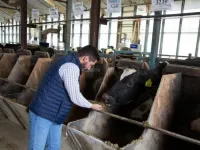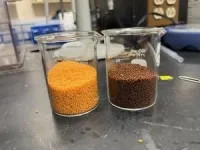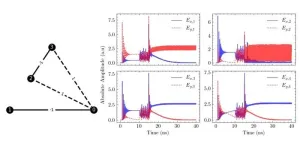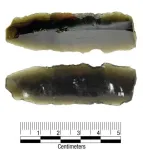(Press-News.org) UNIVERSITY PARK, Pa. — Supplementing the feed of high-producing dairy cows with the botanical extract capsicum oleoresin, obtained from chili peppers, or a combination of that extract and clove oil resulted in the animals using feed energy more efficiently and emitting less methane from their largest stomach, according to a new study conducted by Penn State researchers.
Adding those substances, sometimes referred to as essential oils, to the cattle’s rations resulted in improved efficiency of energy utilization in peak-lactation dairy cows. According to Alex Hristov, distinguished professor of dairy nutrition, corresponding author of the study, the cattle would use the available energy for body weight gain rather than milk yield or milk components.
The findings, recently published in the Journal of Dairy Science, suggest a potential positive physiological and environmental effect of supplementation with this combination of botanicals. From previous studies, the researchers knew that botanicals have the potential to modify fermentation in the dairy cow’s largest stomach, called the rumen, Hristov explained, adding that he has become increasingly interested in post-ruminal, physiological effects of botanicals.
Hristov’s research group in the College of Agricultural Sciences has experimented with supplementing the feed of high-performing dairy cows, with additives ranging from seaweed to garlic and oregano oils to synthetic additives, in a nearly two-decades-long effort to improve milk production and reduce environmental emissions from dairy farms.
Methane — a potent greenhouse gas released into the atmosphere by the cows belching — results from fermentation occurring in the cow’s rumen. That process allows the animal to consume and utilize fibrous feeds and byproducts that cannot be digested by humans or other simple-stomach farm animals.
Although methane mitigation was not an objective of this research project, the researchers reported that the yield and intensity of methane from cows in the study were decreased by 11% by the combination of capsicum oleoresin and clove oil. The effect was particularly pronounced in first-lactation cows.
“We concluded that capsicum oleoresin may affect energy and nitrogen utilization of the cows, whereas the ruminal fermentation and methane-mitigation effects likely were triggered by an associative effect of capsicum oleoresin and clove oil or clove oil alone,” Hristov said.
Botanicals — plant-derived bio-active compounds also called phytonutrients — have shown a wide range of anti-microbial properties against bacteria, protozoa and fungi, and have been investigated as potential rumen modifiers in ruminants, Hristov pointed out. Studies with non-ruminant species have shown that phytonutrients can trigger, at low doses, specific responses related to gastrointestinal health and immunity in animals.
Various botanicals, with active ingredients such as eugenol, cinnamaldehyde, allicin and capsaicin, can trigger immune responses, reduce oxidative stress and influence insulin secretion and activity, Hristov noted. Other studies have shown that botanicals can regulate pro- or anti-inflammatory responses by increasing or decreasing inflammatory proteins involved in the immune system, white blood cells and oxidative stress in nonruminants and, potentially, in ruminants.
In this 10-week experiment conducted at the Penn State Dairy Barns, led by Leoni Martins, doctoral degree candidate in animal science, 48 Holstein cows were randomly assigned to one of three dietary treatments. The rations of 16 were supplemented with 300 milligrams per cow each day of capsicum oleoresin; 16 received a diet supplemented with 300 milligrams per cow each day of a combination of capsicum oleoresin and clove oil; and a 16-cow control group was fed a diet without supplements.
Throughout the experiment, body weight increased in cows supplemented with capsicum oleoresin and a combination of capsicum oleoresin and clove oil, by 850 and 660 grams per day respectively, compared to a negligible 10 grams per day for the unsupplemented control group. Cows fed diets supplemented by the botanicals also exhibited higher efficiency of energy utilization, revealed by several metabolic measurements.
“The use of rumen-protected capsicum — which partially passes through the rumen without affecting fermentation, but still can be digested in the cow's intestine — represents an interesting approach to improve metabolic status of dairy cows during the transition period of three weeks before and three weeks after giving birth, and early lactation,” Hristov said. “But the mechanism underlying this response remains unclear.”
Contributing to this research were Sergio Cueva, Taina Silvestre, Nadiia Stepanchenko and Derek Wasson, graduate assistants in Hristov’s lab in the Department of Animal Science; and Emma Wall, Department of Technology Deployment, AVT Natural Products, Animal Nutrition & Health.
The U.S. Department of Agriculture, National Institute of Food and Agriculture and AVT Natural Products supported this work.
END
Dairy cows fed botanicals-supplemented diets use energy more efficiently
Cattle consuming feed with chili pepper extract, clove oil belch less methane
2024-02-23
ELSE PRESS RELEASES FROM THIS DATE:
Aston University receives nearly half a million pounds to create safer and greener batteries
2024-02-23
• Researchers to explore the use of gel electrolyte materials to improve lithium-ion batteries
• The batteries are the most commonly used in electric vehicles and electronics
• Will use non-harmful, non-flammable and renewably sourced materials for next generation battery technologies.
Aston University researchers are to explore the use of gel electrolyte materials to make lithium-ion batteries - the most commonly used for electric vehicles and electronics - safer and less environmentally damaging.
The University has received a grant of £443,058 from the Engineering and Physical Sciences Research ...
New study shows glycan sugar coating of IgG immunoglobulin can predict cardiovascular health
2024-02-23
When people hear about predicting heart disease, most will think of cholesterol levels. While cholesterol is a major contributor to heart disease, a recent study from Brigham and Women's Hospital, a founding member of Mass General Brigham, found that a glycan biomarker of IgG is also an important predictor for cardiovascular diseases (CVD). The researchers studied the sugar coatings on an antibody known as immunoglobulin G (IgG), which is implicated in the immune responses associated with chronic inflammation among participants in two case-control studies. The results of this investigation provide another biomarker for identifying risk of CVD, which could lead to earlier diagnosis ...
Sir Peter Rigby appointed as honorary chair of Aston University’s new Digital Futures Institute
2024-02-23
Sir Peter was knighted for his contribution to IT and businesses in the Midlands in 2002
He will provide guidance, support, advocacy and strong links to industry in his role
The Institute will drive digital innovation and ensure digital inclusion.
Aston University is delighted to announce that it has appointed one of the UK’s most respected and successful business leaders, Sir Peter Rigby, as honorary chair of its new Digital Futures Institute.
The announcement of Sir Peter’s appointment was made in front of guests at the inaugural lecture given by Professor Abdul Sadka, director of the Digital ...
Yale School of Medicine receives a $575,000 grant from PolyBio Research Foundation to fund long COVID research
2024-02-23
Yale School of Medicine and its Center for Infection & Immunity (CII) are receiving a $575,000 grant from PolyBio Research Foundation to fund Long COVID research. The grant—issued via PolyBio’s LongCovid Research Consortium (LCRC)— will support a collaboration to define mechanisms by which the SARS-CoV-2 virus can persist for long periods of time in tissue and blood.
There is growing evidence that SARS-CoV-2 may not fully clear from Long COVID patients after initial infection. Instead, reservoirs of the virus can persist in patient tissue for months or even years, with recent research finding the SARS-CoV-2 ...
Common plant could help reduce food insecurity, researchers find
2024-02-23
UNIVERSITY PARK, Pa. — An often-overlooked water plant that can double its biomass in two days, capture nitrogen from the air — making it a valuable green fertilizer — and be fed to poultry and livestock could serve as life-saving food for humans in the event of a catastrophe or disaster, a new study led by Penn State researchers suggests.
Native to the eastern U.S., the plant, azolla caroliniana Willd — commonly known as Carolina azolla — also could ease food insecurity in the near future, according to findings ...
Innovative chemotherapy approach shows promise against lung cancer
2024-02-23
Lung cancer is not the most common form of cancer, but it is by far the deadliest.
Despite treatments such as surgery, radiation therapy and chemotherapy, only about a quarter of all people with the disease will live more than five years after diagnosis, and lung cancer kills more than 1.8 million people worldwide each year, according to the World Health Organization.
To improve the odds for patients with lung cancer, researchers from The University of Texas at Arlington and UT Southwestern Medical Center have pioneered a novel approach to deliver cancer-killing drugs directly into cancer cells.
“Our method ...
Encoding computers of the future
2024-02-23
In our data-driven era, solving complex problems efficiently is crucial. However, traditional computers often struggle with this task when dealing with a large number of interacting variables, leading to inefficiencies such as the von Neumann bottleneck. A new type of collective state computing has emerged to address this issue by mapping these optimization problems onto something called the Ising problem in magnetism.
Here's how it works: Imagine representing a problem as a graph, where nodes are connected by edges. Each node has two states, either +1 ...
Artifact could be linked to Spanish explorer Coronado's expedition across Texas Panhandle
2024-02-23
DALLAS (SMU) – It’s a small piece of obsidian, just over 5 centimeters long, likely found on a hard-scrabble piece of ranchland in the Texas panhandle. But when SMU anthropologist Matthew Boulanger looks at it, he gets a mental image of Spanish explorer Francisco Vasquez de Coronado making his way across the plains more than 470 years ago in search of a fabled city of gold.
Boulanger believes that the flaked-stone tool with its sharp edge was likely dropped by a member of Coronado’s ...
Do’s and don'ts with direct oral anticoagulants
2024-02-23
Direct oral anticoagulants (DOACs) are a common treatment for patients with a wide variety of cardiovascular conditions. DOACs are the preferred treatment over vitamin K antagonists (VKAs) for many patients with atrial fibrillation or venous thromboembolism, since the latter would have a higher risk of intracranial bleeding and more complex dosing routine. However, new research suggests that DOACs should not be the first line of treatment for every patient who need to treat or prevent blood clots. A systematic overview from researchers at Brigham and Women’s Hospital, a founding member of Mass General Brigham, discusses the efficacy ...
Super strong magnetic fields leave imprint on nuclear matter
2024-02-23
UPTON, NY—A new analysis by the STAR collaboration at the Relativistic Heavy Ion Collider (RHIC), a particle collider at the U.S. Department of Energy’s (DOE) Brookhaven National Laboratory, provides the first direct evidence of the imprint left by what may be the universe’s most powerful magnetic fields on “deconfined” nuclear matter. The evidence comes from measuring the way differently charged particles separate when emerging from collisions of atomic nuclei at this DOE Office of Science user ...
LAST 30 PRESS RELEASES:
Industrial research labs were invented in Europe but made the U.S. a tech superpower
Enzymes work as Maxwell's demon by using memory stored as motion
Methane’s missing emissions: The underestimated impact of small sources
Beating cancer by eating cancer
How sleep disruption impairs social memory: Oxytocin circuits reveal mechanisms and therapeutic opportunities
Natural compound from pomegranate leaves disrupts disease-causing amyloid
A depression treatment that once took eight weeks may work just as well in one
New study calls for personalized, tiered approach to postpartum care
The hidden breath of cities: Why we need to look closer at public fountains
Rewetting peatlands could unlock more effective carbon removal using biochar
Microplastics discovered in prostate tumors
ACES marks 150 years of the Morrow Plots, our nation's oldest research field
Physicists open door to future, hyper-efficient ‘orbitronic’ devices
$80 million supports research into exceptional longevity
Why the planet doesn’t dry out together: scientists solve a global climate puzzle
Global greening: The Earth’s green wave is shifting
You don't need to be very altruistic to stop an epidemic
Signs on Stone Age objects: Precursor to written language dates back 40,000 years
MIT study reveals climatic fingerprints of wildfires and volcanic eruptions
A shift from the sandlot to the travel team for youth sports
Hair-width LEDs could replace lasers
The hidden infections that refuse to go away: how household practices can stop deadly diseases
Ochsner MD Anderson uses groundbreaking TIL therapy to treat advanced melanoma in adults
A heatshield for ‘never-wet’ surfaces: Rice engineering team repels even near-boiling water with low-cost, scalable coating
Skills from being a birder may change—and benefit—your brain
Waterloo researchers turning plastic waste into vinegar
Measuring the expansion of the universe with cosmic fireworks
How horses whinny: Whistling while singing
US newborn hepatitis B virus vaccination rates
When influencers raise a glass, young viewers want to join them
[Press-News.org] Dairy cows fed botanicals-supplemented diets use energy more efficientlyCattle consuming feed with chili pepper extract, clove oil belch less methane









